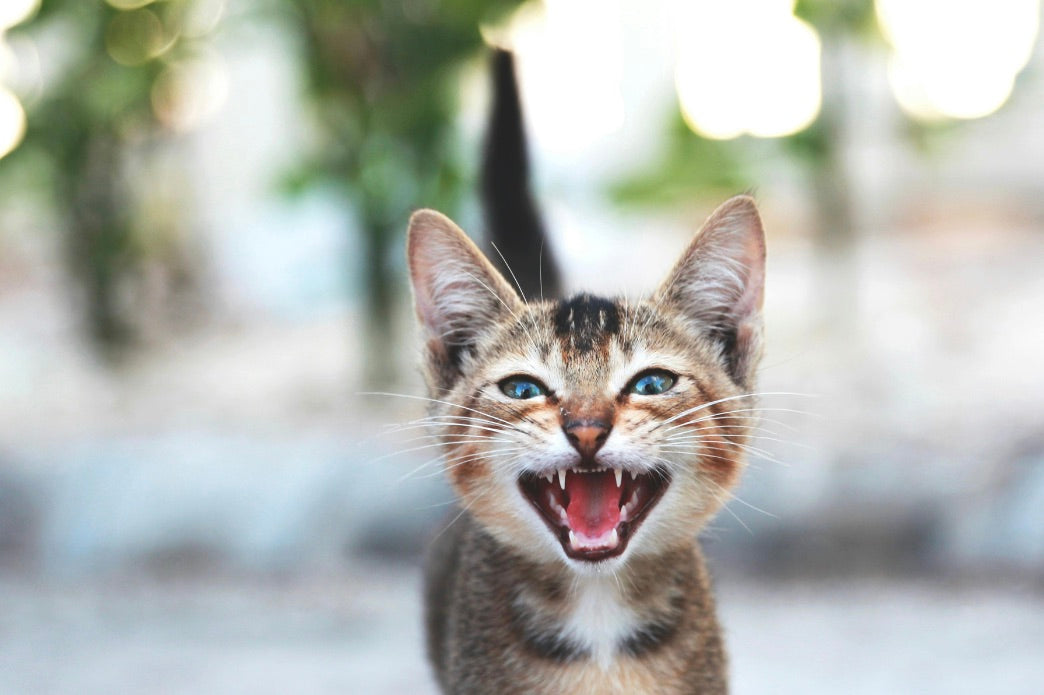Next working day delivery with Royal Mail Tracked 24
Why Won’t My Cat Stop Meowing?

Why Won’t My Cat Stop Meowing?
Meows, chirps, trills and purrs - if you have a cat, you’ll likely recognise their language and feel like you understand what they need. A cat’s meow can be adorable, but what does it mean if your cat won’t stop meowing? Is it a sign that something is wrong? Is it a sign that your cat is spoilt? And how do you get them to stop? Here we discuss some of the reasons why your cat might be incessant with their cries, and what you should do.
Reasons your cat won’t stop meowing:
Behavioural and Environmental factors:
If your cat gets into a pattern of expecting certain treatment from you, then it could be that their meowing comes from a place of being too spoiled! We know - how is that possible?! It can be easy to give into your cat’s cries. For example, feeding them whenever they want might be a simple way to stop their fussing, but ultimately this can encourage a cycle of meow-and-supply (i.e. your cat will learn that they will get what they want whenever they hit you with their cutest meow).
- Attention-seeking: the most common cause of excessive meowing is your cat asking for food, treats, water or entertainment. Moreover, some cats repetitively meow when they want to bring to your attention the prize they have hunted and brought home for you (‘Look Mum! I’m an apex predator, and this mouse is a gift from me to you! You’re welcome!).
- Boredom or loneliness: cats tend to meow more when they’re seeking interaction, so if they are trying to find you or someone to engage with, they may repetitively meow until they have found company.
- Stress or anxiety: changing routines, new environments and anxious-attachments to people/ their owner might cause your cat to meow more than usual as they are expressing their anxiety/ discomfort surrounding change.
- Mating season: cats that have not been neutered or spayed tend to be more vocal during mating season (generally March - September for the UK).

Medical Issues:
If your cat is excessively meowing, it can be easy to assume that they are attention-seeking or in need of something from you, like food or toys. But it is incredibly important to investigate further, especially if this is uncharacteristic of your cat, and rule out any medical issues.
- Pain or discomfort: cat’s don’t speak our language, so repetitive meowing is the only way they can communicate their distress to us.
- Neurological problems: hearing or vision impairments/ loss can lead to increased meowing. Additionally, older cats that grow senile may suffer cognitive dysfunctions that cause them to meow more.
- Underlying diseases: essentially, your cat has limited ways to communicate that they are unwell, or that something doesn’t feel quite right. Excessive meowing could be a crucial signal to you that something needs investigating and a trip to the vet is in order!
Practical solutions:
It’s all good and well being aware of the potential causes of your cat’s excessive meowing, but what can you actually do to help both you and your cat?
- Rule out medical issues: we don’t want to sound like a broken record, but there is no harm in getting you cat checked out by their vet to rule out any serious cause of excessive or unusual behaviour.
- Increase attention: whilst it might not be best to give in to your cat’s demands at any given moment, spending more time with your cat and giving them affection in general can minimise their need to plead for your attention.
-
Provide enrichment: enrichment is important for any pet, particularly if they are indoor cats or are alone for long periods of the day. Providing more toys, particularly interactive toys, can keep your cat satisfied, engaged and entertained.
- Establish a routine: establishing a consistent feeding routine can not only normalise your cat’s expectations as to when to expect food, but it can help to reduce anxiety and stress. Make sure that water is always accessible, via water bowls or water fountains, and consider whether your cat will have dry food or wet food, to manage their expectations.
More likely than not, your cat is just really fond of your company (and your ability to magic-up food), and is turning to excessive meowing to gain your attention. Sometimes it can be good to ignore this pattern of meowing, as it discourages their spoilt behaviour and may minimise incessant meowing in the future. However, always err on the side of caution, and seek medical advice to rule out any underlying or imminent health issues. Otherwise, there are some simple fixes you can do to make your cat more assured, tended to and quieter!
